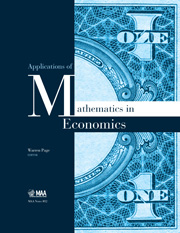Book contents
- Frontmatter
- Contents
- Preface
- Notes on the Sections
- Problems and Subject Areas
- 1 Microeconomics
- 2 Scenarios Involving Marginal Analysis
- 3 Intermediate Macroeconomics Theory
- 4 Closed Linear Systems
- 5 Mathematics in Behavioral Economics
- 6 Econometrics
- 7 The Portfolio Problem
- 8 Topics in Modern Finance
- 9 Maximizing Profit with Production Constraints
- About the Editor
- About the Authors
4 - Closed Linear Systems
- Frontmatter
- Contents
- Preface
- Notes on the Sections
- Problems and Subject Areas
- 1 Microeconomics
- 2 Scenarios Involving Marginal Analysis
- 3 Intermediate Macroeconomics Theory
- 4 Closed Linear Systems
- 5 Mathematics in Behavioral Economics
- 6 Econometrics
- 7 The Portfolio Problem
- 8 Topics in Modern Finance
- 9 Maximizing Profit with Production Constraints
- About the Editor
- About the Authors
Summary
Introduction
A linear economy is governed by linear (matrix) equations. A closed economy is self-contained in some way – for instance, all goods produced are consumed, or expenditures equal income. Wassily Leontief's fundamental work [2], for which he received the Nobel Prize in Economics in 1973, explains how production interacts with consumption, labor, and prices. We present three models of a closed linear economy and show how each can attain equilibrium (state of stability). In Section 2, the Production Adjustment Model explains how production adjusts to satisfy demand, and the Price Adjustment Model finds prices that balance income and expenditures. Relating the models, we arrive at the equilibrium principle: total spent on consumption is equal to the total paid for labor. Section 3 treats the Normalized Leontief Model, a simplified version that combines the previous two models. This section is self-contained and may be dealt with independently of Section 2. Section 4 contains solutions to the problems.
To understand the models, students should be familiar with matrix operations and systems of linear equations in matrix form. To prove the theorems, in the Problems Section, students need to know the Monotone Convergence Theorem (a monotonic sequences converges if and only if it is bounded) and understand the meaning of a convergent infinite series.
- Type
- Chapter
- Information
- Applications of Mathematics in Economics , pp. 45 - 54Publisher: Mathematical Association of AmericaPrint publication year: 2013

